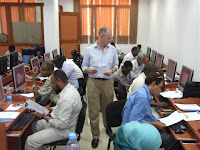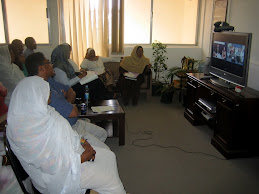

One of the most successful workshop (according to the participants feedback) was run from 1-5 of August in the University of Khartoum. The workshop title was “ICT for ELT in the Horn of Africa: Options and Approaches”. The reason behind the success story of the workshop was the type of organization between the different partners and trainers of the workshop.
The organizers of the workshop were the British Council Khartoum, the University of Khartoum and Clarity Language Consultants Ltd, a language software producers based in Hong Kong with contributions from the Open University of Sudan (OUS) and Zain Sudan. The British Council was able to support participants from 14 different Sudanese University and the British Council in Addis Abba was able to support two participants from Ethiopian Universities. The University of Khartoum supported 10 of its teachers and provided the venue. The three main organizers worked very closely to organize all the logistics of running this hands-on workshop.
One of the main objectives for this workshop was to try d to shed light on the different options and approaches for the use of ICT for English language teaching. Traditionally Africa has lagged behind the rest of the world regarding the use of Information Communication Technology (ICT) in language teaching with inadequate ICT infrastructures, limited financial resources, large class sizes and relatively low ICT skills among teachers and students, commonly cited as the main reasons for this. However, this situation is gradually beginning to change. In Sudan, for example, ICT equipment is now widely available and, in Khartoum and in other major urban centres, mobile Internet is increasingly becoming available. At the same time, education ministries and universities are proving more willing to invest resources in ICT facilities for learning, and, while this tends to be more focused on science and technology subjects, there is a growing realisation that these can also be used for English language teaching.
The workshop aimed at raising the participants’ awareness of the role ICT can play in language teaching and related fields, such as professional development training, and to explore ways in which it can be used effectively within the contextual constraints teachers face in Sub-Saharan Africa. It is aimed primarily at tertiary level teachers of English / teacher trainers with a degree of ICT competence and an interest in seeing its use expanded within their university or institute.
The main topics of the workshop were:
• rationale for using ICT for ELT
• practical ideas for using ICT in lessons
• getting to know a new program
• common technical problems and how to overcome them
• overview of Computer Assisted Language Learning (CALL) software available
• integrating ICT materials into a course of study using Moodle
• using social networking / wikis / blogs / newsgroups
• ICT as a tool for professional development
• Examples of e.Learning from Sudanese and Ethiopian Universities.
The training consisted of a combination of input sessions, discussions and practical activities. At the end of the week the participants were expected to prepare a set of materials and training plans so that they can cascade the information they have received during the workshop to their colleagues when they return back to their institute.
A factor also for the success of the workshop was the venue. The workshop was conducted in computer lab with a good lan and wireless internet connection. All participants had access to a computer and those with their laptops were able to connect through a wireless. Software needed for the training were installed in the computers. The connection was so excellent that a one hour presentation was delivered from Hong Kong.



